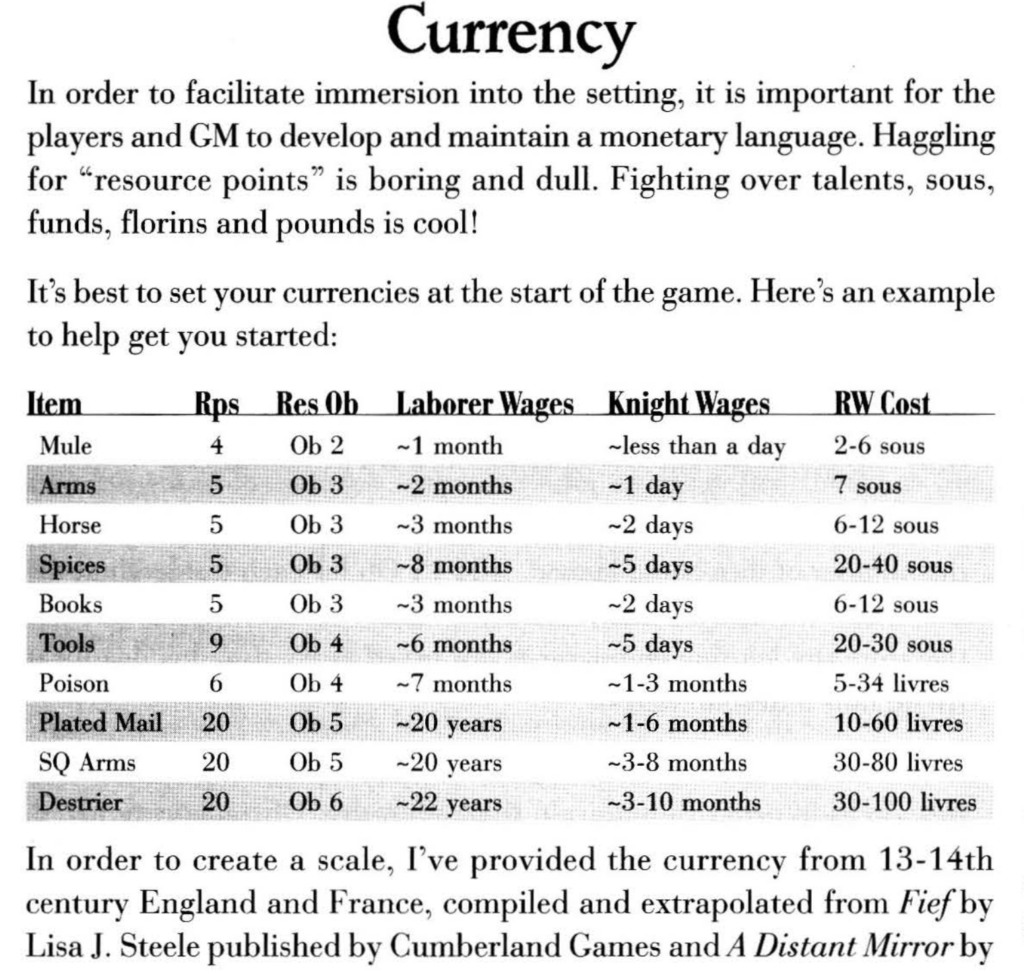Wealth is a deceptively complicated subject when it comes to role-playing game design. While it seems like it should be a relatively straightforward affair, it can quickly become… messy in use. As a result, a number of approaches have been developed to handling wealth in play.
The Traditional Method
This is the one with which most folks are familiar. Everything your character might want to buy has a price listed in some form of currency: gold pieces, silver pieces, crowns, sous, credits, whatever fits the setting at hand. As you adventure, you gain more currency and write it down. When you want something, you spend the currency, subtract it from your current total, erase one number and write the new number down.
On the surface, this seems like the simplest, easiest, most intuitive way to handle things, to the point where in most systems the rules are only implied rather than explained. They just assume you will get it and move on. At the low-end, all of these things are true. You don’t actually need any additional rules for someone to grasp “I have 20sp and need a 10sp sword, I have 10sp left.” The problems only creep in with scale.
The moment you have to deal with any real amount of wealth or complexity, the traditional method can become an infuriating accounting exercise. I have personally been in campaigns where someone broke out Quickbooks to keep track of the groups’ income and expenses, and party to several more where excel spreadsheets were treated as the “easy way” of handling it. The moment you have a particularly wealthy PC, or try to do anything with factions, domain management, hirelings, the whole thing becomes a pain.
This is something that most people realize intuitively. Once ‘the party’ has any real amount of resources at their disposal, most groups and GMs will just stop engaging with the system. They will stop tracking minor expenses and begin guesstimating costs in nice round numbers rather than actually bothering to add things up or keep track.
Wealth as Attribute Check
This is the way that games like The Burning Wheel handle the issue. A character’s overall financial position — their property, savings, liquid currency and ability to secure loans — is treated as an attribute to be rolled against a difficulty based on the price of the item to be purchased.
This approach has a lot to recommend it. It completely removes the need for any kind of traditional bookkeeping and works best at exactly where the traditional method fails. You aren’t adding up shopping lists or keeping track of minor, unimportant expenses. The attribute itself tends to change only rarely, and thus you do not have to erase a hole in your sheet through play. It also scales extremely well, as both the wealth attribute and the costs tend to represent exponential growth, making the fine details of 1000 crowns vs 1050 crowns one beneath the threshold the system cares to model. That means that “ballpark the price” becomes the intentional design, rather than a patch that ignores the rules.
Unfortunately, abstract and exponential are double-edged swords. Where the former allows us to avoid tracking every penny that comes and goes, it loses something in translation at the table. Conveying information in the fiction ends up requiring a parenthetical aside for the players to understand the implication (“He slides a bag of silver across the table. It has to be at least fifty sous. — uh, that’s worth two cash dice.” “The merchant squares up to you and declares he will not sell you the information for anything less than a hundred crowns. — an ob4 check.”) This is actually such an issue that the Burning Wheel books include a little chart to translate the information and back again.

This approach also necessitates the creation of a bunch of ancillary rules to handle things that the traditional approach does by default through via math.
- Because we aren’t adding or subtracting, we need to have rules for making the check itself. What happens if you succeed? What happens if you lose?
- Because we aren’t adding or subtracting, we now need rules for how you improve the attribute, or how it is reduced.
- Because both the attribute and prices tend to be exponential in nature, any amount of wealth that isn’t going to jump the character to the next tier of wealth is either lost or you need a secondary set of rules to represent cash, liquid currency, some kind of one-off bonus to your roll. This gets extra messy because said cash bonus is often linear in nature but then combines with an attribute that scales exponentially. As a result, +1 to someone with an attribute of 8 is worth far more than +1 to someone with an attribute of 2.
- Because of all of the above, presenting large sums to players as rewards gets even more messy. The difficulty in meaningfully sharing or dividing a pot between the characters gives rise to yet more additional rules for things like Treasuries, Hoards, Funds, Stashes: different ways of handling distribution of abstract currency.
- And finally, because everything is exponential, buying multiple somethings almost always requires either a hand wave or another specific rule added on to everything else. Entire shopping lists (such as purchasing something starting gear at character creation) are functionally impossible without resorting to some alternate linear accounting method. Case in point, The Burning Wheel actually uses “Resource Points” for this, which are spent at character creation with the rest of the game’s purchases handled through Resources.
In short, the Attribute Check version is wonderful and saves you a lot of accounting – so long as all you need to do is purchase one item . The cost is learning a small legion of other rules to account for everything else it needs to do. On the other hand, no quickbooks, so… fair?
Wealth as Threshold
This is arguably the simplest version of all, as used by EZD6 and Reign, off the top of my head. Your character has a wealth attribute or a wealth level and every item has a corresponding price. The entire system tends to be expressed as:
- If item is less than your wealth level, you get it
- If item is more than your wealth level, you cannot
- If item is equal to, you get it but reduce wealth level by 1.
This is functional, but also effectively removes wealth as a thing in play. In their defense, this is intentional. Every game I’ve seen do something like this make a statement somewhere in the book along the lines of “this is not a game about wealth, nor one in which the accumulation of wealth is a valid priority.” As a result, it shares a whole lot of problems with Wealth As Attribute Check, but it doesn’t care to solve them. I only mention it here as an aside.
A Hybrid Model
Sword & Scoundrel has traditionally used a heavily modified version of The Burning Wheel’s approach for its wealth mechanic. On the one hand, in many ways we make better use of the core concept than the game which inspired of it. Using wealth as an attribute lets us seamlessly add in elements from elsewhere on the character sheet, tapping in skills and traits as they apply in ways that would be far more complicated — if not impossible — in a strictly traditional wealth tracking system. On the other hand, we’ve also inherited and suffered many of the weaknesses of this approach, requiring a fair amount of additional rules to patch the weirdness abstract wealth can create.
As I prepare to work through the wealth rules for EE, I begin to wonder if a hybrid approach might not be the best way to handle it. My current thinking is this:
Imagine each character has a wealth attribute on the same scale as other attributes, nominally 0-10. This represents their savings, incomes, credit, and so on. Meanwhile, the prices of things in the system are listed in hard currency. When you need to buy something, you check the price against the difficulty chart for the check, which might read something like:
- 1-5sp = r1
- 6-10sp = r2
- 11-20sp = r3
- 21-50sp = r4
- 51-100sp = r5
- And so on.
You can then either make the check with the wealth attribute, or if you have hard currency on hand in the fiction, you can just make the purchase with no check required.
This sounds a bit like the worst of both worlds, but it might actually be the best. It effectively resolves all of the problems of either method with complications that – at least off-hand – do not sound worse than either of the extant set of issues.
You effectively need the following rules established:
- What happens when you succeed, what happens when you fail
- How you lose Wealth attribute, and how you gain it.
- How you convert hard currency to attribute and potentially vice versa. This is probably also how you improve the attribute over time.
The first two already exist in the Wealth as Attribute mechanic regardless. Only the third one is a new issue, but as a tradeoff all of the extant Burning Wheel Resources style problems go away.
- You can now deal with currency exclusively in fictional terms, without having to translate money into mechanics for the players.
- You no longer need extra rules to account for exchanging smaller amounts of wealth between characters or giving them rewards. You can give them the actual fictional amounts and then they can either keep it on-hand, or convert it into their wealth attribute.
- Larger amounts can very easily be distributed between players in a way that was kind of a nightmare with abstract wealth. 2,000 sous splits between 4 players much easier than a 5d Fund.
- When players do need to make shopping lists for whatever reason — most commonly purchasing starting things at character creation — you don’t need to hand-wave the costs or come up with some more convoluted system. When you want, you can just do the math and arrive at an actual result. This latter may actually be the strongest argument for the thing, as even BW had you spend Resource Points at character creation to handle their beginning gear, property, and so on.
- And as a bonus, unrelated to BW flaws: players and GMs who hate abstract resources will have a much easier point from which to hack the resource system out of it.
At the same time, it resolves the main problems with the Traditional Method as well. Nearly all issues of straight currency deal with either scale of wealth or complexity of accounting.
- The more money your character has, the less you want to bother tracking small expenses. This is exactly what abstract wealth systems were designed to deal with in the first place. The existence of a relatively static attribute means we don’t need to track every small purchase, and we only roll the ones that significant enough compared to the wealth attribute to risk its depletion.
- On the other end of the spectrum, it allows us to avoid complex accounting from multiple inputs and outputs. This one is especially true for domain play, where you are potentially dealing with incomes, taxes, expenses for household, upkeep, and then on top of that trying to figure out the exact cost of putting two-hundred and eleven infantry in the field for a six month campaign. You could fire up a spreadsheet to track all of this stuff, or we could deal with ballpark difficulties on a wealth attribute that theoretically represents all of that.
The are two downsides to this approach that need some consideration.
First, you’re relying on the players to engage with the system, which means they need to grok why they’d want to take their 200gp and convert it into +2 to their Wealth score, or whatever. Otherwise, you’ve just got the traditional method, but more complicated.
Second, you’ve added another step to the actual wealth-check process. Where before I’d look up the ob/req of the item being purchased, now I need to look up the cost of the item being purchased, and then compare it to the cost-to-req table to get the actual difficulty of the check. I’m torn on this one because while it is an extra pain, I’m already looking at a chart to get costs to begin with. I certainly don’t have the extant req for every item, property, and beast of burden in my own game memorized and I don’t expect anyone else to, either. Glancing to the conversion chart at the end is probably not that big of a deal in practice, particularly in comparison to the amount of cruft it trims off the periphery.
I’ll have to chew on this one a while longer. Converting one to the other would be a whole process, just due to the way the extant rules are structured. On the other hand, it simplifies the character creation process significantly and would cut out a bunch of extra nonsense from the Wealth chapter. Maybe the tradeoff is worth it? Not sure.
As always, accepting feedback on here, on the discord, etc.
Thanks for your support, Scoundrels.



